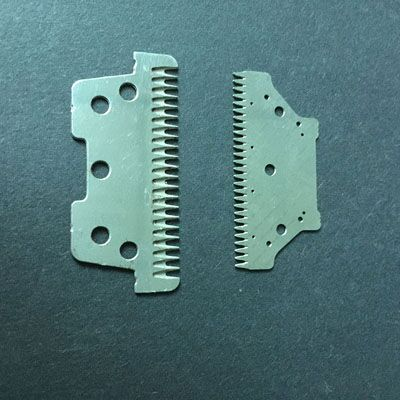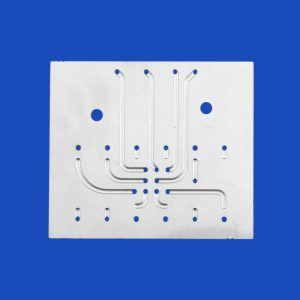
Firstly, in the graphic arts, a process of photo chemical etching and milling (copper, zinc, steel) and also of marble slabs that uses a mask obtained from the photograph of the original to be engraved interposed between the light and a photosensitive layer that serves as a model for the chemical attack.
Secondly, tit is good to use in the preparation of the printing forms of texts and illustrations.
Moreover, photoengraving is a metalworking technique that allows you to create bas-reliefs with images or writings.
The common basis of each process is a photographic plate in negative or positive with the image of the text or illustration. It comes with a layer of dichromate gelatin or light-sensitive photopolymer impresses. As well as, the development of the material layer photo chemical etching and milling allows you to create a mask that selects the areas of chemical attack.
Instead of a classic christening tag, would you like a unique and highly personalized gift? Photo chemical etching and milling is then your new idea to give a unique gift or give yourself an object with a really deep meaning for you.
In fact, customizing means making an object is unique and unrepeatable, far from clichés and from any standard. There will never be an object the same as yours!
In addition, at our jewelry store, and also online, you can bring back on any surface chosen by you. Even a small object, in gold , silver , steel and other materials, a drawing, a face, a particular writing, a symbol or even an entire photograph in digital format, now imprinted on your favorite object.
The photo chemical etching and milling has high precision of the details and cuts allows a perfect processing. Further, It is able to return even a more beautiful and evocative image, enhancing it.
Modern engraving technologies, in fact, allow, through an automatic pantograph with a diamond point. It creates beautiful high-definition images, with perfect shadows and details, even microscopic.
THE MOST SUITABLE MATERIALS FOR photo chemical etching and milling

Subsequently, the materials suitable for photoengraving are: gold, silver, copper, brass, steel, platinum, aluminum. Photoengraving on steel, aluminum, silver and gold is the most sought after.
To achieve this, the screen is good to use which interposes in the photographic phase and sometimes directly when the gelatin layer impresses. Moreover, electronic systems predisposed in the color selection are also good to use to create the screen effect.
Also online, you can request three types of engraving:
Photoengraving: to bring back and enhance a digital image on a jewel, making your gift and your memory unique, to always carry with you.
Photo chemical etching and milling on gold
Engraving of writings, names and other texts: to stamp a date, a name, a phrase, choosing the font you like best.
Engraving of other images and logos: an idea for companies. Imprint your unique brand on unique items.
Photo chemical etching and milling on metal
Thanks to constant investment in research and development and collaboration with qualified technicians up to three different levels, by photoengraving the previously engraved plate.
Think about how many ideas and how many uses:
Furthermore, your engagement date and your names on a padlock through Photo chemical etching and milling.
Photo chemical etching and milling is a technology good to use to engrave metal materials in an extremely precise way. A chemical engraving in corrosive action of an acid is exploited by circumscribing it to the desired areas.
The use of the acid allows to control the depth of the incision and to attack the plate on different levels:
Precision
HIGH PRECISION OF THE DETAILS AND SHARPNESS OF THE CUT
The advantages of photoengraving compared to any other type of mechanical processing given by high precision. It is due to minimum tolerances and sharp and exact cuts.
Photo chemical etching and milling Speed
We guarantee speed both in the prototyping and production phase thanks to the flexibility we have with respect to the quantities to be produced.
The plants have low costs and very fast production times. The complexity of the design does not affect the cost of construction.
During the photo chemical etching and milling process the properties of the material remain unaltered, i.e. they do not undergo any chemical / physical modification, a very important advantage that no other type of processing can guarantee.
A very wide range of materials is easy to process, in thicknesses ranging from 0.05 mm up to 3.00 mm.
Thicknesses and Dimensional Tolerances
Thanks to the photo chemical etching and milling technique it is possible to obtain much reduced dimensional tolerances down to a minimum of +/- 15 microns.
Precision and scrupulousness are the fundamental elements of each of our creations.
The base on which we want to engrave the master is entirely covered with a layer of copper and a chemical compound called “photoresist ". Once the master places on the copper base, this inserts into the chemical etching.
Through ultraviolet light, that part of the photoresist not protected by the master's drawing will be impressed on it.
The impressed photoresist is then removed with caustic soda, leaving the unimpressed one on the base, because it is protected by the master.
A photo chemical etching and milling is quite expensive, usually over 100 euros and much more. If professional features such as digital timer, vacuum pump, contemporary double-sided lighting, large size and so on.
However, it is also possible to build it yourself, an ideal choice for those hobbyists who do not need a real professional chemical company.
